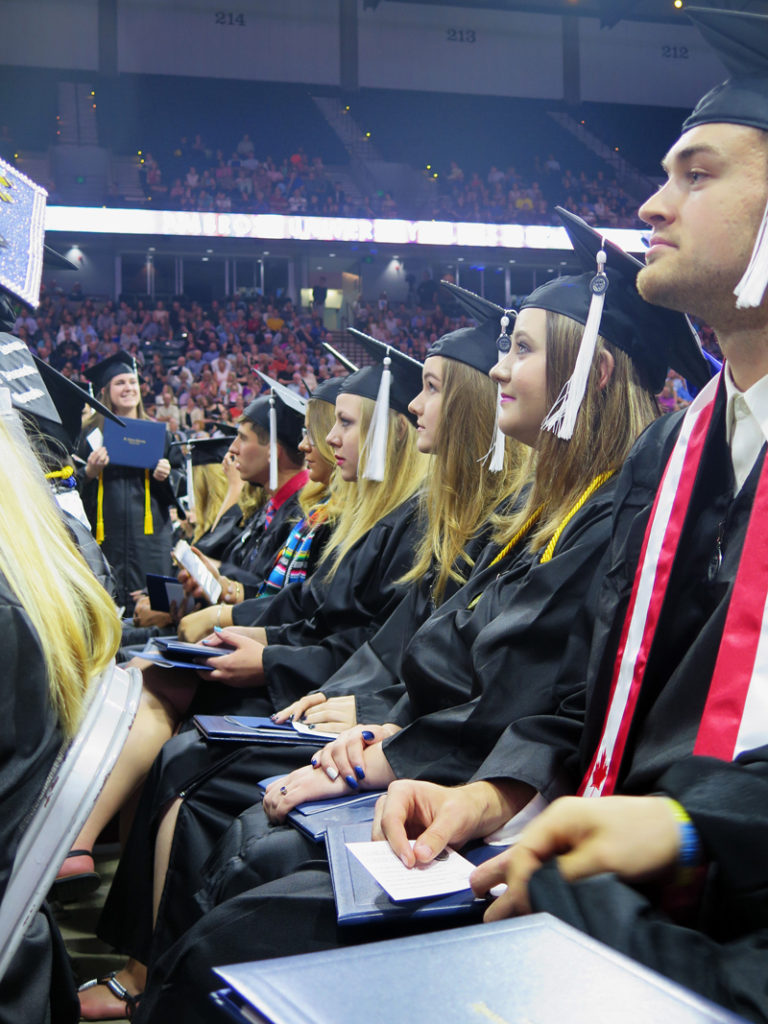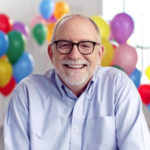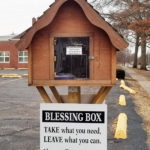By Anne Marie Amacher
The Catholic Messenger
MOLINE, Ill. — Several-thousand people came to the iWireless Center to see their loved ones walk across the stage to receive their diplomas and to hear Ken Hackett speak at the St. Ambrose University commencement ceremony May 13. Hackett is the recently retired U.S. Ambassador to the Holy See and former Catholic Relief Services (CRS) executive director and president. The Davenport-based university awarded 468 bachelor degrees and 194 master degrees.

Graduates listen attentively during St. Ambrose University’s spring graduation ceremony at the iWireless Center in Moline, Ill., on May 13.
“I have learned a bit about commencement addresses over the course of giving 16,” Hackett said. “First, they are on the internet so you have to craft something new for each one. Second, the graduates remember little about what you say — so don’t say much. And third, it’s about the parents, brothers and sisters.”
When he began college, he figured he’d work at the telephone company as his dad did, or some large corporation. During his senior year, he and a friend were walking to the cafeteria when they saw a table with a sign-up sheet for the Peace Corps. The friend asked Hackett if he wanted to sign up for the Peace Corps. “I went in. He didn’t. You go where the spirit moves you.”
Hackett also spoke about his four years as ambassador to the Holy See. He described Pope Francis as a “truly an incredible person” whose work was not always appreciated even before he arrived in Rome. “Even after he was made archbishop, then cardinal, he was not one to hang around Rome after required meetings. He lived simply. He took the subway to visit parishes in the barrios. And that simple lifestyle he brought with him to Rome after he was elected pope.” By watching the pope, Hackett picked up a few lessons he felt were applicable to the St. Ambrose graduates.
• Take time every day to think about the last 24 hours and where God may have laid out a plan. Listen to many opinions, pray and decide. Don’t wring your hands in self-doubt. You will make some mistakes, but those mistakes will make you better.
• It is a messy world with evil in it; be good and show mercy. “I was set aback a bit with I first met Pope Francis when he cautioned me to watch out for the devil. I couldn’t figure out initially what he meant. But after four years listening and diagramming his sentences, I saw he pointed at evil in many places. It can be countered by mercy, goodness and kindness.”
• In the pope’s second letter published in 2014, he stated four principles to building a community of peace, justice and fraternity. They are: time is greater than space, unity prevails over conflict, realities are more important than ideas and the whole is greater than the parts. Hackett focused on two of the principles.
“His first principle encourages us to work slowly without being obsessed with immediate results.” One of the results we observe occasionally is that space and power are preferred to time and processes. “Quick results are often the objective but those short-term results compromise a greater good if processes are not allowed to unfold over time.” Time passes; it leaves us and changes. What is now is not tomorrow. Wait for processes to unfold and good will come.
“The second principle … realities are more important than ideas. The pope talks of the constant tension between the two. He says that it is dangerous to only deal in the realm of ideas; we can’t let ideas become detached from reality.” Hackett cautioned the graduates to watch out for lofty rhetoric and to make sure that ideas are grounded in reality.
He encouraged graduates to discern what is important. “Don’t get stuck in ideologies and ideological rhetoric. Take the time to let events, troubles, joys all unfold. Life is not a lacrosse game with a clock; it’s a baseball game. It is over when it is over.”
Listen to many viewpoints, he advised. Think about them, pray about them and then decide. “We make decisions and many are wrong, but we learn from them. It is easier to ask for apologies than to explain inaction.”
Expect challenges in life and deal with them, he said. “Be bold and be brave … I picked that up during my 40 years with CRS. You are not going to make a difference if you are a wimp. Good luck to you, and be courageous.”











